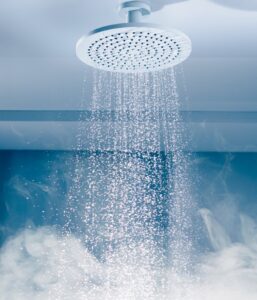Ah, the simple joy of a warm shower at the end of a hectic day! It is something every homeowner cherishes. Thanks to a crucial yet often overlooked home appliance – the hot water tank. However, as with many things in our homes, these tanks have a limited lifespan. And if you have been frustrated with lukewarm showers and rising energy costs, it might be time for a change.
Hi, my name is Jack Devetten, President of Ace Plumbing. Many know me as the Professor of Plumbing. Throughout the 45 years of my career, I have guided countless homeowners on the numerous benefits of upgrading their water tanks. If you are unsure about replacing your old hot water tank, let me show you some compelling reasons to consider an upgrade.
Experience Modern Efficiency at Its Best
Hot water tanks today are a testament to cutting-edge technology, ensuring:
Rapid Heating:
Contemporary models promise quick heating, so everyone in the family can enjoy a hot shower anytime.
Economical Operation:
Thanks to state-of-the-art insulation and efficient heating elements, these tanks can notably decrease your energy bills.
Why?
Sediment and minerals, especially in areas with hard water, can build up at the bottom of the old tank. This buildup can act as an insulator, causing the burner or heating element to work harder and longer to heat the water, consuming more energy and leading to higher energy bills.
Optimal Capacity for Your Needs
Old tanks plagued by sediment often fall short when delivering consistent hot water. Issues like broken dip tubes can lead to cold water surprises during showers.
However, modern tanks:
Provide uninterrupted warmth, guaranteeing a steady hot water supply tailored to the size of your home.
Enjoy Lower Maintenance and Fewer Worries
An aging hot water tank frequently requires repairs, creating a hole in your budget. It can rust or develop leaks over time, especially around fittings, valves, or the tank base. Regularly inspect your tank. And addressing potential failures can prevent leaks that might cause property damage.
In contrast, newer models offer durability:
New hot water tanks designed to withstand common problems promise longevity.
They come with Extended Warranties, which give homeowners additional peace of mind and protection.
A word of caution here
Manufacturers might void a warranty if maintenance. Regular maintenance ensures that you comply with warranty terms.
Speaking of maintenance, did you know that an annual hot water tank check-up could extend the life of your hot water up to 25 years? Are you interested in saving money on repairs with an annual inspection? Let me show you.
Things you can do.
To maintain a hot water tank effectively, homeowners should periodically inspect the hot water tank for signs of leaks, rust, or wear. Check pressure relief valves and flush the tank to remove sediment. Additionally, for those with gas hot water tanks, it is essential to inspect the burner flame and ensure proper venting to prevent carbon monoxide hazards.
Do a visual
If the flame is blue, the fuel-to-air ratio is correct.
An orange flame means dirt and dust are burning off the burner.
Lastly, if there is not enough air, the flame burns yellow. Have the tank inspected immediately to prevent potential carbon monoxide poisoning.
With the latest safety features, modern tanks ensure:
Safety mechanisms like advanced pressure relief valves and accurate thermostats are a few safe enhancements.
Minimal leak risks thanks to corrosion-resistant designs.
Elevates the market value of the home.
If you are thinking of selling your home:
A brand-new hot water tank signals potential buyers that the house is up-to-date and well-maintained.
Peace of mind for potential buyers assures them of several worry-free years ahead.
You are being Environmentally Responsible
Ensuring that your water heater operates efficiently, you reduce wasted energy, which is better for the environment. Inefficient hot water tanks only waste energy. They also lead to more greenhouse gas emissions and a larger carbon footprint.
Hot water tanks and Legionnaires disease
When homeowners go on vacation, it is not uncommon for some to turn their hot water tanks to a lower setting or turn the hot water tank off to save on energy costs, which can have unintended consequences related to Legionnaires disease.
If the water heater is turned down too low or turned off. The temperature within the tank can drop into the range ideal for Legionella bacteria to grow. Between 20°C to 50°C (68°F to 122°F). When the homeowner returns and starts using the water again, there is a possibility of being exposed to a higher concentration of bacteria. Water becomes airborne in showers, faucets, or even certain appliances. There is a risk of inhaling the bacteria and contracting Legionnaires disease.
Therefore, while it might seem cost-effective and environmentally safe to lower the temperature or turn off the tank during vacations, it is vital to be aware of the potential health risks. Should you decide to turn down the temperature? I would recommend running the hot water. Consider raising the temperature briefly to sanitize the system before regular usage and ensure safety precautions are in place to prevent scalding.
In closing
The initial cost of a new hot water tank might seem steep. Saving money and enhanced safety make it a worthy investment.
Remember, the Professor of Plumbing is always here to guide you. And by the way, our motto is that you are Happy Today or You Don’t Pay.



